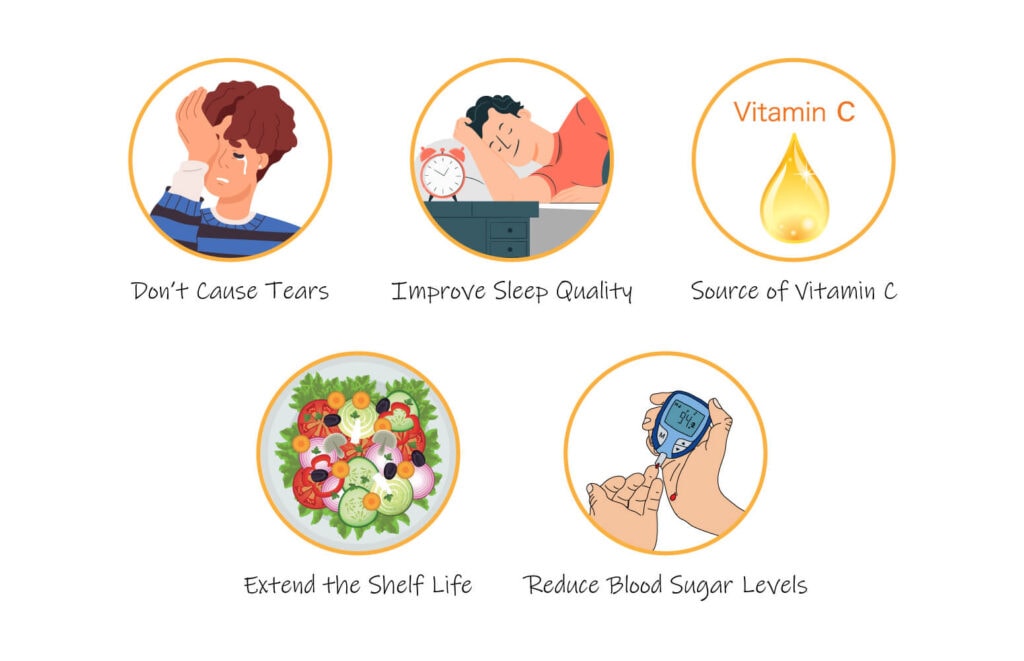Onions, the humble root vegetable, have been a part of our diet for over 5,000 years. They’ve spiced up our dishes, given us the needed zest, and even been used for medicinal purposes. And yet, they’re notorious for one thing – making us cry! You know the drill. You’re happily chopping away, and suddenly, your eyes sting and water. It’s an all-too-familiar scene in kitchens around the world.
But why do onions make you cry? Is it a defense mechanism, some sort of culinary punishment, or the result of scientific happenstance? Let’s dive into the science behind this phenomenon in the next section.
Understanding Why Onions Make You Cry: The Science Explained
The truth is that onions have a chemical defense mechanism against predators. When we slice into an onion, we break its cells, releasing a range of compounds. One of these is an enzyme called alliinase. This enzyme reacts with another compound, sulfenic acid, to produce a volatile gas called syn-propanethial-S-oxide. This gas is what causes our eyes to sting and water.
It’s like a tiny chemical warfare on your chopping board! This reaction is the onion’s saying, “Hey, leave me alone!” But we, the persistent cooks, soldier on, shedding tears but never backing down!
Step-by-Step Guide: How to Cut an Onion Without Crying
Now that we know why onions make us cry let’s tackle the million-dollar question: how to cut an onion without crying. Here’s how to conquer the onion’s defenses and chop them tear-free.
- Chill the onions: Before you start chopping, place the onions in the refrigerator for about 30 minutes. This helps to slow down the enzyme reaction that occurs when you cut into the onion, reducing the release of tear-inducing compounds.
- Use a sharp knife: A sharp knife is crucial for chopping onions. A dull blade crushes more cells, causing more tear-inducing compounds to be released. A sharp knife will make cleaner cuts, minimizing the chemical reaction and reducing tears.
- Keep the root end intact: The root end of the onion contains the highest concentration of tear-jerking compounds. By leaving it intact as long as possible while chopping, you can reduce the amount of these compounds released into the air.
- Use ventilation or a fan: Turn on a fan or open a window to create airflow in the kitchen. This will help to blow the onion gas away from your face, reducing the chance of it reaching your eyes and causing tears.
Following these steps, you can take control of the onion-chopping process and emerge victorious and tear-free.
Unusual Experiences: Why Don’t Some People Cry When Cutting Onions?

You might have encountered folks who claim they don’t cry while chopping onions. Lucky them, right? But why don’t they cry when cutting onions?
Well, sensitivity to the onion’s gas varies from person to person. Some people might not produce enough tears to wash away the irritant, while others might have a higher tolerance for the gas. There’s also the possibility that they’ve built up a tolerance through frequent exposure. So, it’s not a superpower, just varying human physiology!
Tips and Tricks: How to Stop Onions From Making You Cry
Here are some additional tips and tricks on how to stop onions from making you cry. Wearing goggles can protect your eyes from the gas. You can also try cutting under running water or near a steam source to divert the gas.
Always remember to keep your workspace well-ventilated. And if all else fails, embrace it! After all, a few tears are a small price to pay for the delicious flavor onions add to our meals.
Remedies for Burning Eyes After Cutting Onions
No matter how cautious we are, those pesky onion tears have a way of sneaking up on us. But fear not, for we have the perfect solutions to soothe your burning eyes after cutting onions. Here’s what you can do to put an end to the discomfort.
First and foremost, rinse your eyes with cold water. The coolness of the water will help wash away the irritant, providing instant relief. If you have a saline solution or artificial tears on hand, these can also be effective in alleviating the burning sensation. Just a few drops can work wonders in soothing your eyes.
It’s important to resist the urge to touch or rub your eyes during this time. Your hands may still have traces of onion residue, which can further exacerbate the irritation. Instead, opt for a gentle patting motion to dry your eyes after rinsing them.
If the burning persists, it might be a good idea to take a break and step away from the kitchen for a while. Sometimes, changing the environment can do wonders for your eyes and overall well-being. Find a comfortable spot, perhaps near a window with fresh air, and allow your eyes to relax and recover.
So, the next time you find yourself tearing up while chopping onions, don’t despair. These handy tips and tricks allow you to conquer any onion without shedding a tear. Happy cooking, and may your culinary adventures be filled with flavor and joy sans the waterworks!
10 Surprising Myths and Unbelievable Facts About Onions

Onions are a staple ingredient in kitchens around the world. They add flavor, aroma, and texture to a wide range of dishes. But did you know that onions have a fascinating history and many health benefits? Now, we will debunk some common myths surrounding onions and uncover some mind-blowing facts you probably didn’t know about these versatile vegetables.
1. Don’t Cause Tears
One of the most common myths about onions is that they cause tears. However, the real culprit is a volatile compound called syn-propanethial-S-oxide that is released when onions are cut. Chill the onion before cutting or wear goggles while preparing them to minimize tearing.
2. Antibacterial Properties
Onions possess powerful antibacterial properties. They contain a compound called allicin, which helps fight against various bacteria, including Salmonella and E. coli. Including onions in your diet can boost your immune system and protect you from infections.
3. Improve Sleep Quality
If you have trouble sleeping, try consuming onions. They are a natural source of prebiotic fiber, which promotes the growth of beneficial bacteria in your gut. A healthy gut microbiome is linked to better sleep quality and overall well-being.
4. Onions Were Once Used as Currency
Onions have been used as a form of currency in various regions and periods. For example, a retail store in the Philippines accepted onions as payment for select in-store items as part of a food bank program. In Siberia, onions were used as a currency until the mid-18th century.
While not common in modern times, these instances demonstrate the versatility and value of onions in different contexts. In ancient Egypt, onions were considered sacred and often used as a form of payment for workers.
5. Extend the Shelf Life of Cut Fruits and Vegetables
Placing a slice of onion next to cut fruits and vegetables can help prolong their shelf life. Onions release sulfur compounds that have antimicrobial properties, preventing the growth of bacteria and fungi.
6. Alleviate Allergies
Quercetin, the compound responsible for onions’ anti-diabetic properties, is also known for its anti-allergic effects. Consuming onions may help reduce the symptoms of allergies by inhibiting the release of histamines.
7. Source of Vitamin C
While oranges are often hailed as the go-to source of vitamin C, onions also contain a significant amount of this essential nutrient. Vitamin C is important for immune function, collagen production, and overall health.
8. Repel Insects
Onions have a pungent smell that repels many insects. Placing onion slices or juice around your garden can help keep pests at bay. Additionally, applying onion juice to your skin may help repel mosquitoes.
9. Aid in Detoxification
Onions are rich in sulfur-containing compounds that help the body eliminate toxins and heavy metals. These compounds have been shown to enhance liver function and support the body’s natural detoxification processes.
10. Reduce Blood Sugar Levels
Onions contain a compound called quercetin, which has been found to have anti-diabetic properties. Studies have shown that consuming onions may help regulate blood sugar levels, making them a valuable addition to a diabetic-friendly diet.
Onions are not just an essential ingredient in the kitchen; they also boast a range of surprising benefits. From their antibacterial properties to their ability to improve sleep quality, onions have much more to offer than meets the eye. So, the next time you reach for an onion, remember these fascinating facts and enjoy the amazing flavor and health benefits they provide.
Conclusion
There you have it, folks! The mystery of why onions make us cry is finally solved! It turns out it’s all thanks to a bit of chemistry and a dash of human physiology. But don’t let the tears deter you. With the right techniques and patience, you can enjoy your culinary adventures sans the waterworks.
So, the next time you find yourself tearing up while chopping onions, remember, it’s not you—it’s the onion’s chemical warfare! And with our handy tips and tricks, you’ll be well-equipped to tackle any onion that comes your way. Happy cooking!

